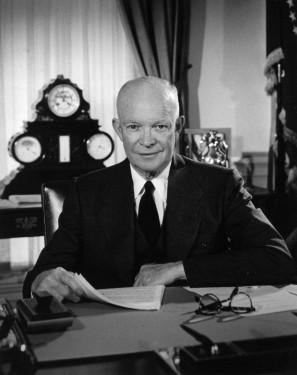Defense Industry Questions Health Effects of Rocket Fuel Additive
by Matthew Madia, 6/25/2009
The military-industrial complex is once again lobbying the Environmental Protection Agency in hopes of staving off regulation of a harmful chemical found in rocket fuel.
 On June 5, officials from several defense contractors, as well as government officials from the Pentagon and the Department of Energy, met with EPA to discuss an upcoming public notice discussing the health effects of the chemical perchlorate. The meeting was organized by the White House Office of Information and Regulatory Affairs (OIRA) which is currently reviewing an advanced draft of EPA’s notice.
On June 5, officials from several defense contractors, as well as government officials from the Pentagon and the Department of Energy, met with EPA to discuss an upcoming public notice discussing the health effects of the chemical perchlorate. The meeting was organized by the White House Office of Information and Regulatory Affairs (OIRA) which is currently reviewing an advanced draft of EPA’s notice.
The defense industry is employing a time-honored industry tradition – questioning scientific conclusions. A document brought to the meeting, unattributed to any specific lobbyist or defense firm, makes a case against regulation. It includes the oft-repeated but usually specious claim that, since a chemical is naturally occurring, it’s safe:
Perchlorate is found naturally throughout the water environment in the 0.5 to 15 ppb range. USGS and other researchers have measured perchlorate in rain, geologic formations, and rivers and aquifers throughout the United States.
Hey, lead is naturally occurring too. Why don’t we start adding back into gasoline and house paint?
Perchlorate, an ingredient in rocket fuel and some fireworks and fertilizers, has been regularly detected in public drinking water supplies. Exposure to perchlorate has been shown to inhibit thyroid functions, subsequently causing developmental problems.
Thus far, the Obama administration has continued the Bush administration’s kicking-the-can-down-the-road strategy on perchlorate regulation. However, EPA administrator Lisa Jackson has pledged to review the Bush’s administration position, and a new “Perchlorate Regulatory Determination” was sent to OIRA for review in May. EPA’s future plans are unclear.
There are not many transparency requirements imposed on these White House/agency/stakeholder meetings, which OIRA frequently orchestrates to allow regulated businesses, public interest groups, and others to air their views of an upcoming regulatory action. As a result, we do not know what was discussed at the meeting.
But in the past, EPA’s efforts to address perchlorate pollution have been hamstrung by defense contractors and their allies in the Pentagon. In 2005, the Natural Resources Defense Council (NRDC) conducted an investigation that showed DOD, with the support of the White House, pressured the National Academies of Science to downplay the adverse health effects of the chemical perchlorate.
For now, the Pentagon appears to have changed its tune. “Shannon Cunniff, director of chemical and material risk management for DOD, said the Pentagon was asked to attend the meeting, along with other federal agencies, to discuss the issues surrounding perchlorate contamination, and was not lobbying for any particular action from EPA,” according to environmental news service Greenwire. “Furthermore, she added, the Pentagon does not agree that advancing a decision would have an adverse impact.”
That’s good news, because without any intra-governmental pressure, it may be easier for EPA to make the most environmentally protective decisions, and to make that decision quickly. Nonetheless, we’ll continue to keep on eye on this issue.



